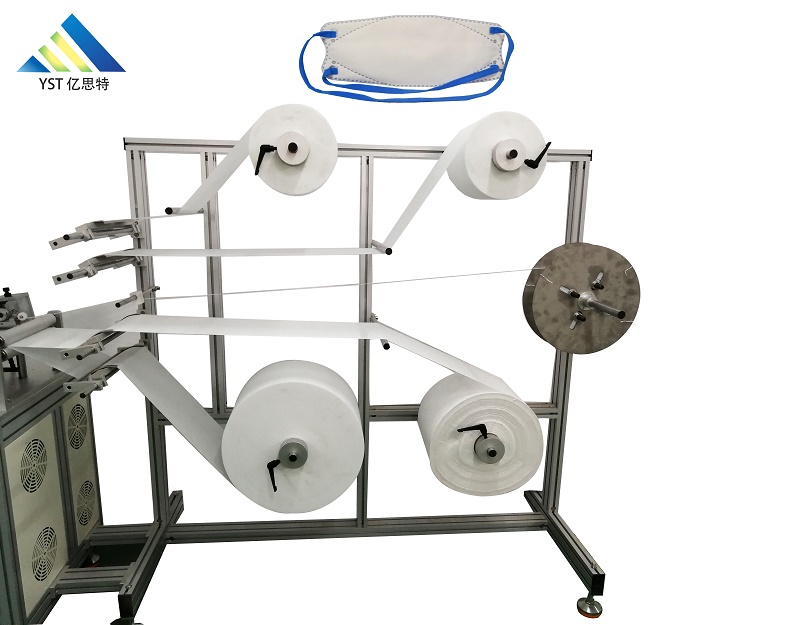Despite the ongoing rollout of coronavirus vaccines, masks remain a critical tool to reducing the spread of COVID-19. But the pandemic has put a premium on both the quality of face masks and the number of them—wearing more than one mask is now becoming a popular habit as more infectious variants of the virus crop up around the United States. Research suggests double-masking can bolster protection, making for a better fit over the mouth and nose with less open space at the edges. At the same time, there is a shortage of clinical-grade personal protective equipment (PPE) in multiple regions.
But what if a metaphorical copying machine could crank out 2,000 masks an hour? Andre Sharon, a Boston University College of Engineering professor of mechanical engineering and materials science and engineering, says such a newly developed device that does just that sits in a Saint Mary’s Street building on the BU campus. Fully Automatic Mask Machine

The 10-foot-long machine, resembling a cross between an old-fashioned printing press and an assembly line, fabricates 2,000 three-ply polypropylene masks per hour.
The center’s machine makes complete masks, while competitor companies require several machines to make masks, Sharon says.
The masks “are made of the same material as medical-grade surgical masks,” says Sharon, who directs BU’s Fraunhofer USA Center for Manufacturing Innovation, where a team of engineers designed and prototyped the machine. The center is a collaboration between the University and the Fraunhofer-Gesellschaft, Europe’s largest applied research organization, based in Germany. Sharon says the center’s mission is to “bridge the gap between academic research and market needs.”
Bridging this gap, in the case of the novel coronavirus, could save lives and protect frontline workers. Sharon says that the masks don’t meet the federal standards for “surgical” masks, but they are the same “general purpose masks” most people wear to deter the spread of COVID-19, including healthcare professionals who don’t work directly with coronavirus patients. The outer layer of the Fraunhofer Center mask covers a middle layer “with excellent breathability,” he says. The third, innermost layer is designed for comfort against the skin.
“We are considering starting with a donation program to supply masks to local area hospitals, health workers, and first responders that have a need,” Sharon says. Meanwhile, he and his team are also pursuing avenues to make the machine commercially available. As a research center, Sharon says, the Fraunhofer Center can’t sell masks directly, but instead “can build machines for others, or license [the machine’s design], or do a start-up [that] would be able to sell [these] machines and/or masks. All options are on the table at this point.”
“With the increased focus on not only the use but also the quality of masks, this work is timely and can potentially make a major contribution to the BU community and beyond,” says Gloria Waters, BU vice president and associate provost for research.
The machine could drastically reduce the travel distance between where masks are made and where they are most badly needed, improving quality control and speed of delivery. “Most of the masks that you see people wearing on the street are made in China,” Sharon says.
But with the compact size of the Fraunhofer Center machine, “it can be installed in small facilities, close to the point of use, or even at the point of use, [locations that could include] hospitals, army bases, companies, universities,” Sharon says. “The machine could be used on demand, similar to the way a copy machine is used. Every few days you go to the machine, punch in how many masks you’d like, and the machine produces them for you.”
If necessary, the machine, “or several machines, could be run continuously to supply a local market,” he says. “This would mitigate supply issues and be a paradigm shift from storing PPE in a central location.”
Another competitive advantage that the Fraunhofer Center machine has against other mask-makers—which in the United States, Sharon says, includes industrial equipment giants 3M, Honeywell, and Kimberly-Clark—is that the center’s machine is a one-stop shop for mask-making. Other systems “require more than one machine to produce the entire mask: one machine to make the pleated fabric mask blanks, another machine to attach the ear loops,” he says. The Fraunhofer Center machine places and welds ear loops to the mask in one seamless process, for which the center is seeking a patent.
This 10-Foot-Long Machine Churns Out 2,000 Face Masks an Hour
Rich Barlow is a senior writer at BU Today and Bostonia magazine. Perhaps the only native of Trenton, N.J., who will volunteer his birthplace without police interrogation, he graduated from Dartmouth College, spent 20 years as a small-town newspaper reporter, and is a former Boston Globe religion columnist, book reviewer, and occasional op-ed contributor. Profile
Devin Hahn creates video content for BU Today, Bostonia online, and The Brink. He is a producer, a cameraman, an editor, and, under duress, a writer. Profile
Cydney Scott has been a professional photographer since graduating from the Ohio University VisCom program in 1998. She spent 10 years shooting for newspapers, first in upstate New York, then Palm Beach County, Fla., before moving back to her home city of Boston and joining BU Photography. Profile
Boston University moderates comments to facilitate an informed, substantive, civil conversation. Abusive, profane, self-promotional, misleading, incoherent or off-topic comments will be rejected. Moderators are staffed during regular business hours (EST) and can only accept comments written in English. Statistics or facts must include a citation or a link to the citation.
This is very cool! Great job!
I am so happy about this invention and hope that it will soon be able to be purchased in the USA and elsewhere. Have shared the article with several friends
This is awesome! Great work.
Your email address will not be published. Required fields are marked *
Boston University’s Alumni Magazine

Willow Leaf Shaped Mask Making Machine Pioneering Research from Boston University